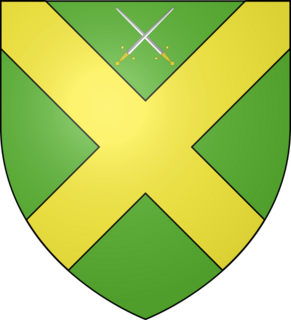The Second Battle of Athenry took place at Athenry in Ireland on 10 August 1316 during the Bruce campaign in Ireland.
Uí Maine was the name of a kingdom situated in south Connacht, consisting of all of County Galway east of Athenry, all of southern and central County Roscommon.
Ailill Medraige mac Indrechtaig was a King of Connacht from the Uí Fiachrach Muaidhe branch of the Connachta. He was the son of Indrechtach mac Dúnchado Muirisci, a previous king and grandson of Dúnchad Muirisci mac Tipraite. He was the first member of this branch since 707 to hold the Connacht throne which had been dominated by the Uí Briúin since that time. He reigned from 756 to 764.
Donn Cothaid mac Cathail, King of Connacht, died 773.
The Uí Fiachrach Muaidhe were a branch of the Uí Fiachrach dynasty of the Connachta. They were centred on the Moy River valley of County Mayo. At its largest extent, their territory, Tír Fhíachrach Múaidhe included the territories of Irrus Domnann and Tír Amhalgaidh now in Co. Mayo. This branch of the Ui Fiachrach was descended from Fiachnae, a brother of Ailill Molt, high king of Ireland. Later their chief sept was the Ó Dubhda (O'Dowd), princes at Carn Amalgaidh, near Killala, Co. Mayo.
Conchobar mac Taidg Mór was a King of Connacht from the Uí Briúin branch of the Connachta. He was the grandson of Muirgius mac Tommaltaig, a previous king. His father Tadg Mór had been slain fighting in Muirgius' wars versus the minor tribes of Connacht. He was of the Síl Muiredaig sept of the Uí Briúin. The Ó Conchobhair septs of Connacht are named for him.
Ailill mac Áedo Róin was a king of the Uí Failge, a Laigin people of County Offaly. He was the son of Áed Rón mac Cathail, a previous king.
Aedh Ailghin was the 22nd King of Uí Maine.
The Kings of Uí Fiachrach Aidhne were rulers of a Trícha cét located in the cóiced of Connacht, Ireland.
The Kings of Umaill were rulers of Umaill a kingdom or territory located in the west of what is now County Mayo, Ireland.
Aodh mac Muirchertach Ua Dubhda, King of Ui Fiachrach Muaidhe, died 1143.
Ruaidhrí Ó Dubhda, King of Ui Fiachrach Muaidhe, fl. 1380.
Ruaidhrí Mear Ua Dubhda, King of Ui Fiachrach Muaidhe, fl. 1143X1162.
Caomhán mac Connmhach, Eponym and Ancestor of the Clan Ó Caomháin of north Connacht, fl. 9th-10th century. The surname is variously anglicised as Keevan, Kevane, Keeveen, Keevans, Keaven, Keavan, Cavan.
The Uí Fiachrach were a dynasty who originated in, and whose descendants later ruled, the coicead or fifth of Connacht at different times from the mid-first millennium onwards. They claimed descent from Fiachrae, an older half-brother of Niall Noigiallach or Niall of the Nine Hostages. Fiachrae and his two full brothers, Brion and Ailill, were the collective ancestors of the Connachta dynasty that eventually became the new name of the province. Their mother was Mongfind.
Leabhar na nGenealach is a massive genealogical collection written mainly in the years 1649 to 1650, at the college-house of St. Nicholas' Collegiate Church, Galway, by Dubhaltach MacFhirbhisigh. He continued to add material until at least 1666, five years before he was murdered in 1671. The original 17th century manuscript was bequeathed to University College Dublin (UCD), by Dublin solicitor Arthur Cox in 1929, and can be consulted in UCD Library Special Collections. The manuscript can be viewed online at Irish Script on Screen in English, and in Irish. Leabhar na nGenealach, was reprinted, and published in a five volume edition in Dublin in 2004 as The Great Book of Irish Genealogies.
Dubhaltach MacFhirbhisigh, also known as Dubhaltach Óg mac Giolla Íosa Mór mac Dubhaltach Mór Mac Fhirbhisigh, Duald Mac Firbis, Dudly Ferbisie, and Dualdus Firbissius was an Irish scribe, translator, historian and genealogist. Active during the years c.1640 to 1671, he was one of the last traditionally trained Irish Gaelic scholars, and was a member of the Clan MacFhirbhisigh, a leading family of northern Connacht. His best-known work is the Leabhar na nGenealach, which was published in 2004 as The Great Book of Irish Genealogies, more than 300 years after it had been written.
Nollaig Ó Muraíle is an Irish scholar. He published an acclaimed edition of Dubhaltach Mac Fhirbhisigh's Leabhar na nGenealach in 2004. He was admitted to the Royal Irish Academy in 2009.

